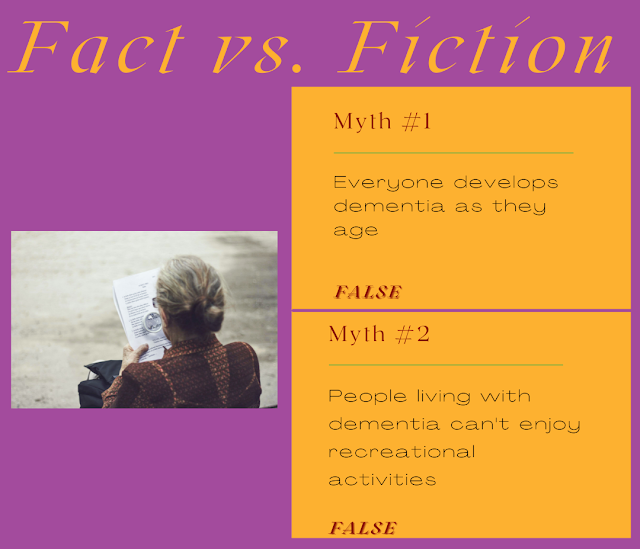Myth 1. Everyone develops dementia as they age.
Although around 40% of people aged 65+ experience some changes in short-term memory as a normal part of aging, there is more to dementia than this experience. There are multiple different types of dementia, but all result in a loss of cognitive functioning that can interfere with everyday activities. These effects extend beyond memory and may impact language skills, personality, visual perception, or attention span. The Public Health Agency of Canada (PHAC) estimates that, in 2014, 7.1% of Canadians aged 65+ were living with dementia. Two-thirds of those were women.
Dementia is a degenerative condition, meaning that daily living is affected progressively more as more changes occur within the brain. This fact can make it difficult to tell the difference between dementia and the normal effects of aging in the early stages. Many people cope with the first changes through alterations to their routines, such as setting alarms for important events, keeping items that require attention in a visible location, using a pill organizer, or other memory aids.
So, while it is common to develop dementia as one ages, and age is one of the largest risk factors, many seniors live without dementia. Differentiating between normal changes that occur and the early stages of dementia can be difficult, but there are resources available to help navigate and understand a diagnosis. Your family doctor is always a great place to start, and they can provide referrals to specialized resources. You can also contact Service Options for Seniors (https://www.soscamrose.com/) for help navigating the resources available to you.
Despite the changes that occur with dementia, it is possible to find fulfillment after a diagnosis, leading us to myth #2 for today...
Myth 2. People with dementia cannot enjoy activities.
People with dementia can participate in recreational activities throughout the progression of their illness. As dementia is a progressive disease, this will look different as individuals experience the changes associated with dementia progression. Participation in recreational activities suited to individual interests and their current stage can help to enhance quality of life.
Although participation is possible and positive, people living with dementia often struggle to begin an activity or understand how to participate. This can create frustration for individuals and adjusting recreation to an appropriate level can help to limit frustration and increase quality of life. Personality and interest changes are common as dementia progresses. However, this is not the same as no longer finding enjoyment in activities.
When planning activities many things haven’t changed – everyone has different interests and skills. I love music and am a pretty good pianist, but I have no interest in photography and take terrible photos! So, if I were planning a creative activity for myself, or if someone wanted to surprise me, it would make much more sense to organize a jam session and provide me a keyboard than go out searching for great pictures. People with dementia are all individuals as well, so keep interests in mind, then consider the modifications that can be made to match current abilities. This will look different for each activity and each level, but some examples include using memory aids for a loved card game, putting together 63-piece puzzles, or finding books with more white space and a shorter duration.
You can also check out the programs and resources available through us! We have a wide variety of programming for everyone and that includes people living with dementia and carers. Check out our speaker series this summer featuring author readings from Su Croll and Rhonda Hoffman. We will also be inviting educational speakers, more information to come. For something to take home, you can check out our monthly Mind Masters newsletter filled with puzzles, our weekly Tales and Travels podcast and activity kit, our dementia activity kits, or check out Marlena Books from our collection. Our staff are always happy to help you find the right program or activity for you!
For more information on typical aging and dementia visit:
https://alzheimer.ca/en/about-dementia/do-i-have-dementia/differences-between-normal-aging-dementia
For more information on recreation and dementia visit:
https://alzheimer.ca/en/help-support/im-living-dementia/living-well-dementia
Other Sources
Canadian Institute for Health: https://www.cihi.ca/en/dementia-in-canada/how-dementia-impacts-canadians
Gary W. Small https://www.ncbi.nlm.nih.gov/pmc/articles/PMC1123445/
